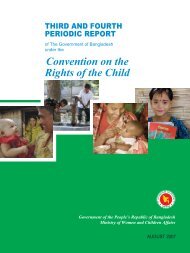Government-funded programmes and services for vulnerable - Unicef
Government-funded programmes and services for vulnerable - Unicef
Government-funded programmes and services for vulnerable - Unicef
Create successful ePaper yourself
Turn your PDF publications into a flip-book with our unique Google optimized e-Paper software.
<strong>Government</strong>-<strong>funded</strong> <strong>programmes</strong> <strong>and</strong> <strong>services</strong> <strong>for</strong> <strong>vulnerable</strong> children in SA<br />
School enrolment, attendance <strong>and</strong> documentation<br />
The imposition of school enrolment, attendance <strong>and</strong> documentation requirements <strong>for</strong> CSG<br />
beneficiaries may hinder easy access to the CSG by <strong>vulnerable</strong> children.<br />
As described in some detail in Table 3.1, the new Regulations to the Social Assistance Act<br />
require the caregivers of all children between the ages of 7 <strong>and</strong> 18 who apply <strong>for</strong> or receive<br />
the CSG to provide proof of the child’s enrolment <strong>and</strong> attendance at school. Furthermore,<br />
the Regulations require the Department of Education (DoE) to monitor the attendance of<br />
CSG recipients <strong>and</strong> advise the DoSD if such recipients are not attending school.<br />
There are three potential problems inherent in these requirements. First, even though the<br />
Regulations very clearly do not make school enrolment or attendance a qualifying condition<br />
<strong>for</strong> receipt of the CSG, there is a risk that the SASSA officials may read the imposition of this<br />
condition as a qualifying criterion. If this happens, we will see, as has happened in relation to<br />
misinterpretations of other documentation requirements by SASSA officials, that children are<br />
barred from accessing the CSG because they cannot obtain the necessary school documents<br />
or cannot enrol at or attend school. This is particularly problematic in the context of children<br />
made more <strong>vulnerable</strong> by HIV/AIDS as they are particularly at risk of not enrolling or<br />
attending school, <strong>for</strong> the many reasons spelt out in more detail in Chapter 5. The introduction<br />
of this new requirement linked to the CSG may aggravate the exclusion of <strong>vulnerable</strong> children<br />
from school rather than serve to improve their rate of enrolment <strong>and</strong> attendance.<br />
A further problem that may arise in relation to these new requirements is the lack of<br />
proper attendance record keeping <strong>and</strong> in<strong>for</strong>mation management at schools, especially<br />
the more <strong>vulnerable</strong> schools which register higher volumes of <strong>vulnerable</strong> children. The<br />
systems as they are currently implemented <strong>and</strong> managed at school level will make it<br />
difficult <strong>for</strong> all schools to be able to record attendance <strong>and</strong> produce reports to the DoSD<br />
regarding attendance or lack thereof by CSG recipients. 37<br />
The third problem that will inhibit the implementation of the new Regulations is the<br />
severe shortage of social workers in South Africa, which already inhibits the proper<br />
implementation of child protection <strong>services</strong> in the country. The new Regulations require<br />
a social worker investigation whenever a report of non-enrolment or non-attendance by<br />
a CSG recipient is made to the DoSD. As discussed in some detail later, South Africa is<br />
experiencing a severe shortage of social workers, which will make it impossible to meet<br />
the investigative obligations required by the Regulations.<br />
Oversubscription of the FCG<br />
The FCG has become a primary source of financial support <strong>for</strong> family members caring<br />
<strong>for</strong> orphaned or ab<strong>and</strong>oned children (Meintjies et al. 2003). This saw the number of FCG<br />
beneficiaries increasing tenfold between 2000 <strong>and</strong> 2008 from 49 843 in 2000 to 445 282 in<br />
2008. 38 The underlying problem, from a service delivery point of view, is that access to the<br />
FCG must be preceded by a full <strong>and</strong> <strong>for</strong>mal foster care investigation by a social worker <strong>and</strong><br />
hearing by a children’s court. This has resulted in the caseload of social workers becoming<br />
completely unmanageable <strong>and</strong> their role has turned into a largely administrative one of<br />
rubber-stamping foster care investigations so as to expedite the foster parent’s access to the<br />
FCG. Likewise, it has caused bottlenecks in the courts, which results in keeping children<br />
37 Private correspondence with Kevin Roussel, director of ACESS<br />
38 Statistics from the DoSD Annual Report, 2000/01, <strong>and</strong> SASSA Social Security Statistical Report, 29 February 2008,<br />
quoted in National Welfare, Social Service <strong>and</strong> Development Forum, 2008<br />
68
















